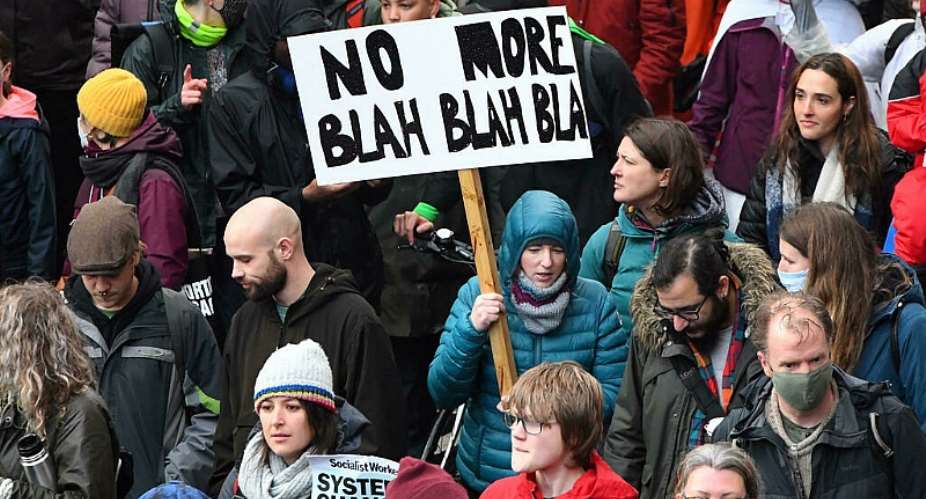Nearly 200 nations came together Saturday to sign up to a global deal to combat climate change after two weeks of painful negotiations. However, the accord has fallen short of what science says is needed to contain catastrophic temperature rises.
Saturday evening, rich countries stood accused of failing at the COP26 summit in Glasgow to deliver much-needed finance to vulnerable states at risk of drought, rising seas, fire and storms.
Britain's COP26 president Alok Sharma rounded up the marathon negotiations telling delegates: "It is now decision time. And the choices you are set to make are vitally important."
But China and India insisted that language on fossil fuels be weakened in the final summit decision text.
As the final deal was clinched, a tearful Sharma said "I apologise for the way this process has unfolded. I am deeply sorry," before banging down his gavel.
Delegates entered the talks charged with keeping the 2015 Paris Agreement goal of limiting temperature rises to 1.5°-2°C within reach.
- France commits to end global financing of fossil fuels by 2022
- COP26: Australia says it will continue to export coal on a massive scale for 'decades'
Not enough
They were also tasked with finding the funding for nations most at risk of climate-related droughts, floods and storms supercharged by rising seas.
Observers said the agreement fell far short of what is needed to avert dangerous warming and help countries adapt or recoup damages from the disasters already unfurling globally.
UN Secretary General Antonio Guterres welcomed the deal, but stressed it was "not enough".
"We are still knocking on the door of climate catastrophe," he added.
Swedish environmental activist Greta Thunberg said the talks had achieved nothing but "blah, blah, blah", echoing earlier comments.
Laurence Tubiana, the architect of the Paris deal, sais that "COP has failed to provide immediate assistance for people suffering now."
But a statement from the European Commission said the deal had "kept the Paris targets alive".
British Prime Minister Boris Johnson, whose government hosted the talks, insisted the deal was a "big step forward" even if much more work needed to be done.
Struggle for survival
The final text urges nations to accelerate their efforts to "phase down" unfiltered coal and "phase out" inefficient fossil fuel subsidies.
Large emitters China and India had opposed the mention of the polluting fuels, and the language in the final text was significantly more nuanced than earlier drafts.
The deal also called on all countries to accelerate their emissions cuts by submitting new national plans by 2022, three years earlier than agreed in Paris.
However after resistance from rich nations led by the United States and the EU, the text omitted any reference to a specific finance facility for the loss and damage climate change has already caused in the developing world.
It instead only promised future "dialogue" on the subject.
Although host Britain said it wanted COP26 to keep the 1.5°C temperature cap within reach, a UN scientific assessment last week said countries' latest climate plans put Earth on course to heat 2.7°C.
The text noted "with deep regret" that wealthy nations had also failed to stump up a separate annual sum of $100 billion they promised over a decade ago.
It urged countries to pay up "urgently and through 2025".





 Meta releases new version of conversational AI across its platforms
Meta releases new version of conversational AI across its platforms
 Cape Town named Africa’s Best Airport 2024 by Skytrax
Cape Town named Africa’s Best Airport 2024 by Skytrax
 Bono East: Four injured after hearse transporting corpse crashes into a truck
Bono East: Four injured after hearse transporting corpse crashes into a truck
 ‘Be courageous, find your voice to defend our democracy’ — Sam Jonah urges journ...
‘Be courageous, find your voice to defend our democracy’ — Sam Jonah urges journ...
 Exodus of doctors, nurses and teachers have worsened because of unserious Akufo-...
Exodus of doctors, nurses and teachers have worsened because of unserious Akufo-...
 2024 election: Avoid insults, cutting down people in search of power – National ...
2024 election: Avoid insults, cutting down people in search of power – National ...
 ‘You passed through the back door but congratulations’ — Atubiga on Prof Jane Na...
‘You passed through the back door but congratulations’ — Atubiga on Prof Jane Na...
 Government’s $21.1 billion added to the stock of public debt has been spent judi...
Government’s $21.1 billion added to the stock of public debt has been spent judi...
 Akufo-Addo will soon relocate Mahama’s Ridge Hospital to Kumasi for recommission...
Akufo-Addo will soon relocate Mahama’s Ridge Hospital to Kumasi for recommission...
 We must not compromise on our defence of national interest; this is the time to ...
We must not compromise on our defence of national interest; this is the time to ...
